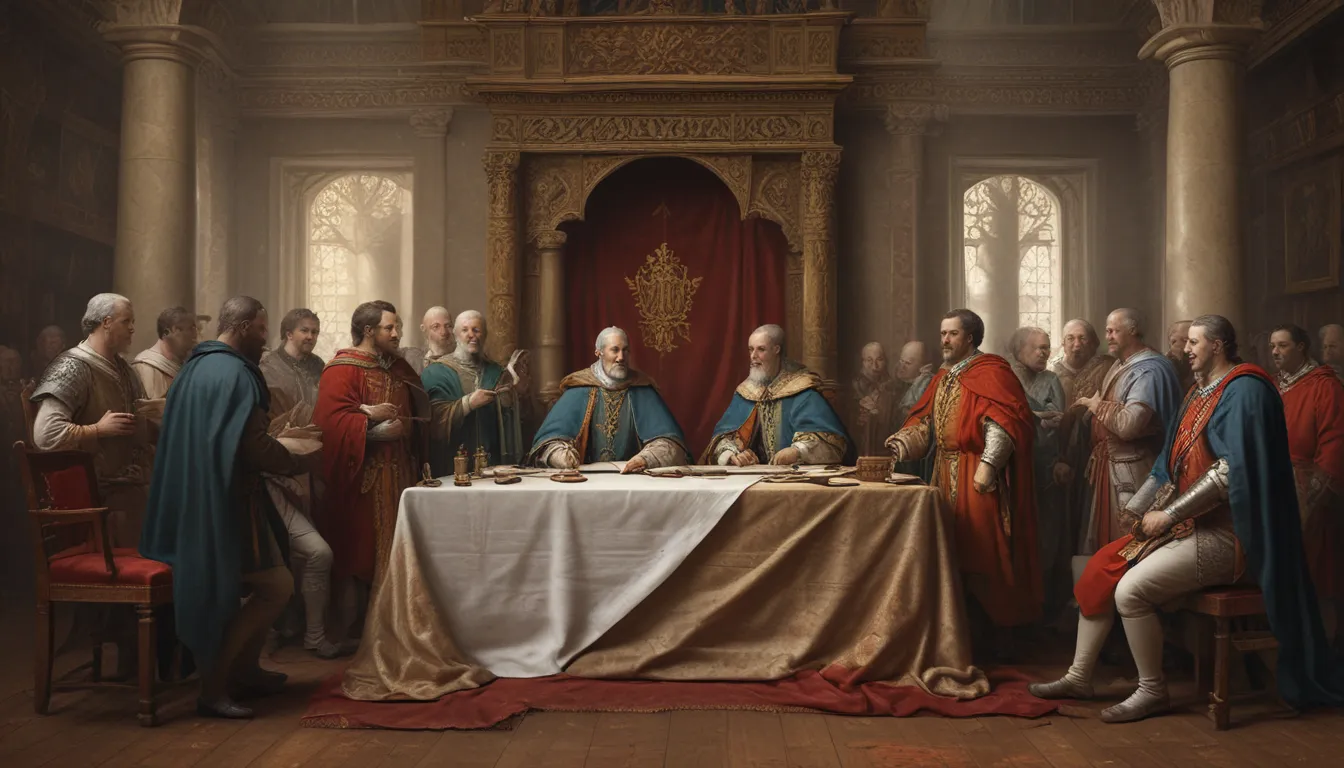The images in our articles may not match the content exactly. They are used to grab your attention, not to show the exact details in the text. The images complement the text but do not replace it.
Have you ever pondered the enduring impact of a document created over 800 years ago? The Magna Carta, a legendary parchment from 1215, continues to shape modern law and society, embodying principles of freedom and justice that resonate even today. This historical heavyweight holds the key to understanding the rights we cherish and the legal systems we navigate. Join us on a journey as we explore 17 captivating facts about The Magna Carta, shedding light on its profound influence and timeless relevance.
Unveiling the Magna Carta: A Revered Symbol of Liberty
At the heart of the Magna Carta lies a pivotal moment in history: King John of England and a group of rebellious barons coming together to pen a groundbreaking agreement on June 15, 1215. This document, also known as the Great Charter, sought to bridge the divide between an unpopular king and discontented nobles. Written in Latin, the scholarly and legal language of the time, the Magna Carta laid down laws to safeguard the rights and freedoms of the common people against the king’s arbitrary power.
Amidst the drama of medieval politics, the Magna Carta emerged as a beacon of hope, setting a precedent for upholding the rule of law over the whims of rulers. Its significance reverberated across centuries, shaping legal systems worldwide and becoming a symbol of freedom and equality that transcends time and borders.
Revisiting the Magna Carta’s Creation and Purpose
The genesis of the Magna Carta can be traced back to a tumultuous period in English history when King John’s heavy-handed rule and exorbitant tax demands fueled discontent among barons and church officials. Faced with the looming threat of civil war, a compact was forged to avert bloodshed and enshrine key rights and laws to protect the kingdom’s people.
This historic document, essentially a peace treaty between king and barons, contained clauses that curtailed the king’s power and established safeguards against tyranny. Notable provisions included the requirement for royal officials to abide by the law and the protection of church rights, laying a foundation for principles of justice and accountability that resonate to this day.
Unveiling the Key Clauses of the Magna Carta
Within the intricate web of clauses and agreements that composed the Magna Carta, certain provisions stood out for their enduring impact on legal systems and human rights. Among these, Clause 39 and Clause 40 encapsulated fundamental principles of justice and fairness that transcended the medieval context in which they were penned.
Clause 39 proclaimed the right of every individual to a fair trial by their peers or the law of the land, safeguarding against arbitrary arrests or imprisonments. Similarly, Clause 40 underscored the sanctity of justice, decreeing that it should neither be sold, denied, nor delayed to anyone. These foundational principles laid the groundwork for a legal framework based on accountability, transparency, and the rule of law.
Tracing the Magna Carta’s Influence on Modern Legal Systems
The legacy of the Magna Carta reverberates through the annals of legal history, leaving an indelible mark on modern legal frameworks and foundational documents. Its principles served as a catalyst for the evolution of constitutional law in the English-speaking world, paving the way for democratic governance and individual liberties.
From the United States Constitution to the Universal Declaration of Human Rights, the Magna Carta’s imprint can be discerned in key legal texts and doctrines that uphold freedom, justice, and equality. Across diverse cultures and traditions, its legacy endures as a testament to the enduring struggle for human rights and the rule of law.
Celebrating the Magna Carta’s Enduring Legacy
Despite the centuries that have passed since its creation, the Magna Carta remains a touchstone of cultural and legal significance in the modern world. Recognized for its global impact on democracy and human rights, the Magna Carta was enshrined in UNESCO’s Memory of the World Register in 2009, underscoring its enduring relevance and value.
Through special exhibitions, educational programs, books, and films, the Magna Carta continues to captivate audiences and inspire new generations with its timeless message of justice and liberty. Its intrinsic worth was affirmed in 2007 when a 1297 version of the Magna Carta, confirmed by Edward I, fetched a staggering $21.3 million, symbolizing its status as an invaluable relic of liberty and democracy.
Dispelling Misconceptions About the Magna Carta
Amidst the acclaim and reverence accorded to the Magna Carta, myths and misconceptions have clouded its true significance and impact on history and law. By dispelling these fallacies, we can gain a clearer understanding of the Magna Carta’s role as a foundational document in the evolution of democratic governance and legal principles.
Contrary to popular belief, the Magna Carta did not establish democracy in England but laid the groundwork for parliamentary democracy over centuries. Additionally, it was not the sole document to curb the powers of English monarchs, as the Charter of Liberties issued by Henry I in 1100 also sought to limit royal authority. Despite initial setbacks and modifications, the Magna Carta’s core principles have endured, shaping legal systems and democratic ideals worldwide.
Embracing the Magna Carta’s Enduring Lessons
In conclusion, the Magna Carta stands as a testament to the enduring power of written charters to challenge, inspire, and shape the course of history. Its legacy transcends time and space, embodying universal ideals of freedom, justice, and equality that resonate with people around the globe. As we navigate the complexities of modern society, the Magna Carta’s lessons serve as a beacon of hope and a call to uphold the rule of law in the pursuit of justice and liberty.
Through its remarkable journey from 1215 to the present day, the Magna Carta reminds us that the quest for liberty and equality is a continuous endeavor, demanding vigilance, perseverance, and a steadfast commitment to upholding the principles of justice and accountability. Let us draw inspiration from this historic document as we strive to build a more just, equitable, and inclusive society for all.
Engaging with Magna Carta: A Quest for Knowledge
As we delve into the intricate tapestry of the Magna Carta’s history and significance, we invite you to explore its timeless legacy and unrivaled influence on modern society. Through a deeper understanding of its key clauses, historical context, and enduring impact, we can glean invaluable insights into the evolution of democracy, law, and human rights.
Whether you’re a history enthusiast, a legal scholar, or a curious learner eager to unlock the secrets of the past, the Magna Carta offers a wealth of knowledge and wisdom to enrich your intellectual journey. Join us in celebrating the enduring legacy of this iconic document and its profound implications for the pursuit of justice, liberty, and equality in our ever-evolving world.
Inquire Further: FAQs on the Magna Carta
-
What exactly is the Magna Carta, and why is it so significant?
The Magna Carta, often referred to as the Great Charter, is a historical document sealed by King John of England in 1215. It holds immense significance as a cornerstone of modern democracy and law, emphasizing that everyone, including the king, is subject to the law. -
How many original copies of the Magna Carta are still in existence?
Today, only four original copies of the Magna Carta from 1215 remain, meticulously preserved in locations such as the British Library and various cathedrals across the UK. -
Did the Magna Carta apply to all citizens of England when it was first issued?
Initially, the Magna Carta’s protections were primarily extended to the medieval elite, like barons and noblemen, rather than the general populace. However, its principles have since been interpreted more broadly to apply to all citizens. -
What are some key rights and principles established by the Magna Carta?
Among its myriad clauses, the Magna Carta affirmed the right to a fair trial, habeas corpus, land rights, protection from illegal imprisonment, and access to swift justice, laying the groundwork for modern legal principles. -
How has the Magna Carta influenced modern legal systems?
The Magna Carta has profoundly impacted legal systems worldwide, particularly in common law countries like the United States and the United Kingdom. Its ideals of liberty and justice continue to shape legal thought and practice today. -
Can one visit the locations where the original Magna Cartas are housed?
Visitors can explore the original Magna Cartas on display at various sites, including the British Library in London and historical cathedrals such as Salisbury, Lincoln, and Durham. These locations offer a unique glimpse into the historical significance of this remarkable document. -
Was the Magna Carta always respected and upheld throughout history?
While the Magna Carta faced challenges, annulments, and revisions in its early years, its core principles endured, influencing legal systems and democratic ideals across generations and continents. -
What role did the Magna Carta play in the development of democracy?
The Magna Carta is hailed as a foundational document in the evolution of democratic governance, emphasizing the importance of rulers governing with the consent of the governed and establishing laws agreed upon by society.
Our Commitment to Trustworthy Content
At the crux of our mission lies a dedication to delivering credible, engaging content that enlightens and empowers our readers. Each fact shared on our platform is a product of real user contributions, ensuring a rich tapestry of diverse insights and information. Our vigilant editors meticulously review each submission to maintain the highest standards of accuracy and reliability, guaranteeing that the facts we present are not only captivating but also authentic. Trust in our unwavering commitment to quality and authenticity as you journey with us through a world of discovery and knowledge.






